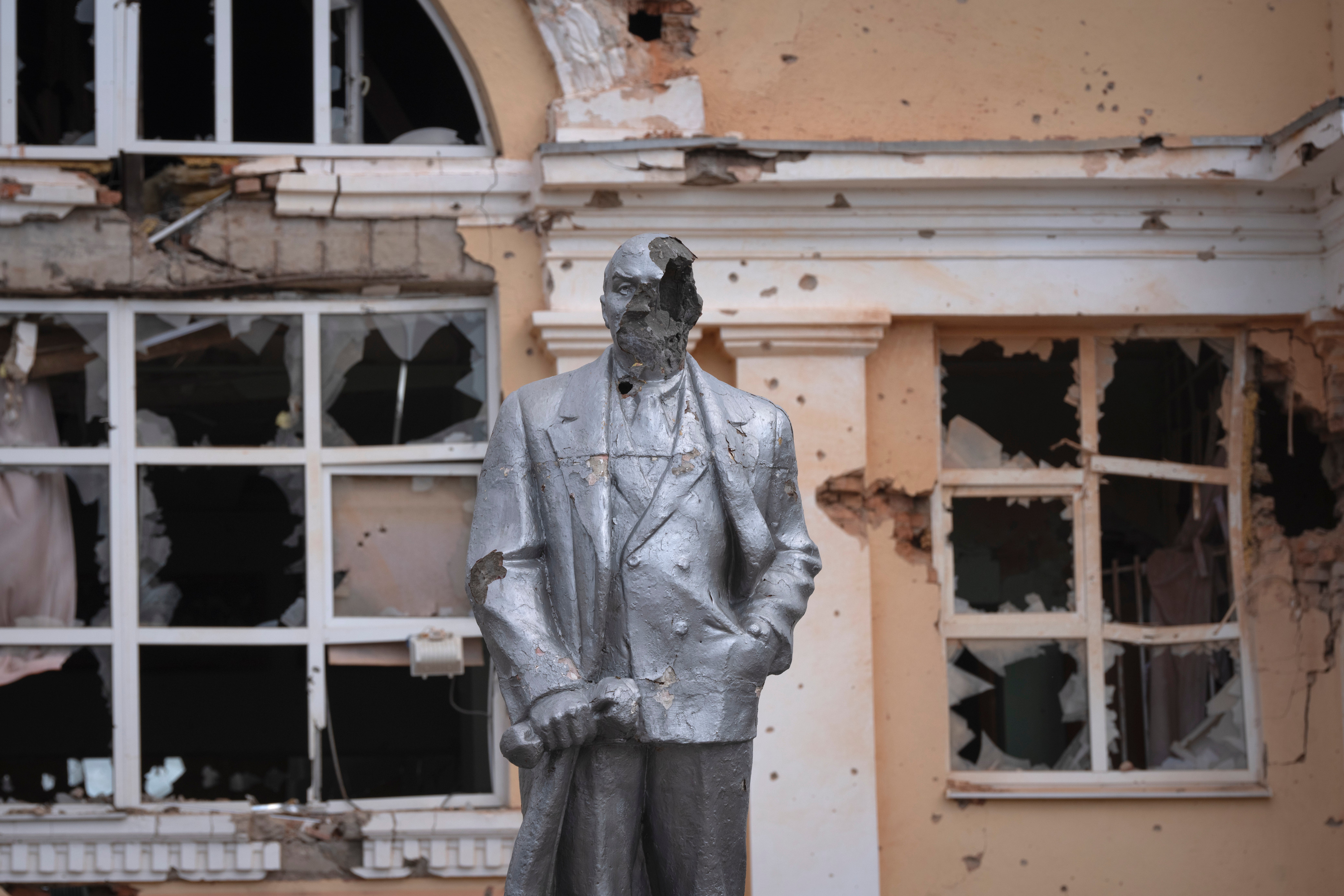Kursk’s damaged Lenin statue is a monument to Putin’s incompetence
Editorial: As the Russian leader continues to be humiliated by Ukraine’s successful invasion of its territory, president Volodymyr Zelensky must now ask himself: what comes next?

The statue of Vladimir Ilyich Lenin is still standing in the town square of Sudzha in the Kursk region of Russia – but, rather like the territorial integrity of the Russian Federation, the reputation of the Russian army and the political standing of Vladimir Putin, it has had chunks blown out of it by the audacious Ukrainian military incursion.
Launched only a fortnight ago, it has surely succeeded beyond the wildest hopes of the Ukrainian leadership. The question now for president Volodymyr Zelensky and his colleagues is: what next?
There is every indication that the answer to this question will be as shrewd as the way the exercise itself was planned. It has more than fulfilled its objectives, and greatly to the advantage of Ukraine. It has demonstrated to all concerned, but especially Western leaders, that their financial and military assistance has been put to excellent use.
For Ukrainians too, after a series of setbacks and stalemates settling across the battlegrounds, it is timely proof that the Ukrainians can “do” offensive as well as defensive moves, and with elan. Psychologically, it has boosted Ukrainian morale and depressed the Russian people, confronted as they are with direct, graphic evidence of Russian military incompetence.
That battered statue of Lenin, his face half-destroyed and leaving him looking a little like Arnold Schwarzenegger in The Terminator, the civilian evacuations and the rest of the damage inflicted on Russian sovereign territory is incontrovertible evidence that President Putin is not the indefatigable guarantee of Russian security but a man floundering in a military morass of his own making.
Hundreds more Russian soldiers have been captured and as the usual harsh Steppes winter approaches, the prospect for Russian victory is as remote as ever. Like the surprisingly easy march on Moscow by Yevgeny Prigozhin and his Wagner Group mercenaries last year, there has been scant resistance to the Ukrainian incursion, suggesting that Mr Putin’s position as strongman may not be as invincible as his propagandists claim.
The Russian president is, after all, now facing the first invasion of the Russian lands since 1941 – a humiliation for a man who sees himself as a latter-day Peter the Great or Joseph Stalin. That’s not the kind of historical echo he is likely to feature in any of his rambling televised monologues.
It must be tempting for some in Kyiv to push ever deeper into Russian territory and try to occupy it as a bargaining chip in the peace negotiations that must surely come before much longer. That would be unwise, however, and President Zelensky’s adviser, Mykhailo Podolyak, has said that Ukraine is “not interested in occupying Russian territories … We have absolutely no plans to beg: ‘Please, sit down to negotiate’.”
Having conducted an audacious lightning war, using British and other Western tanks and armoured vehicles, Ukraine has made the necessary point. Attempting to hang on against eventually overwhelming Russian forces would mean losses of men and equipment rather than an orderly withdrawal.
Western countries might also grow anxious about certain weapons being used on Russian soil, and with it the risk of escalation (though Mr Putin’s nuclear bluff has been well and truly called). Mr Putin is now painfully aware that Russia’s thinly defended provinces neighbouring Ukraine are vulnerable to attack. Russian forces will have to be diverted from their grinding advance in Donbas, and some will have to be deployed defensively more broadly in future.
On balance, then, Ukraine is in a better position than it was at the beginning of 2024; and Russia, and in particular Vladimir Putin, is in a worse one. Yet the future of Ukraine will, in the end, not be decided so much on the battlefields around Kharkiv, Toretsk or Pokrovsky but rather in the polling booths of Pennsylvania, Wisconsin and Arizona.
Everyone knows that if Donald Trump prevails in the November presidential election, then the war will be over for Ukraine, and President Zelensky would be lucky to retain the territories held by his forces at the time Mr Trump does his deal with his friend Mr Putin – because without US support, Ukraine will collapse, militarily and economically.
Its independence will be extinguished. Its people will have to resort to guerilla tactics if it refuses to surrender, and Mr Zelensky will end up as leader-in-exile. But if Kamala Harris wins, as looks more likely, then the policy will be unchanged.
Peace talks will come, if only because of the war of attrition that is setting in, and these will be much more even-handed and considered than the armistice Mr Trump promises can be finalised, and imposed on Kyiv, “within 24 hours”.
At the moment, the war and political trends are both going Mr Zelensky’s way. He’s winning, after a fashion, the West is still backing him and the F16 fighters are ready for action. That should keep Ukrainian resistance going until Mr Putin is ready to talk.






Join our commenting forum
Join thought-provoking conversations, follow other Independent readers and see their replies
Comments